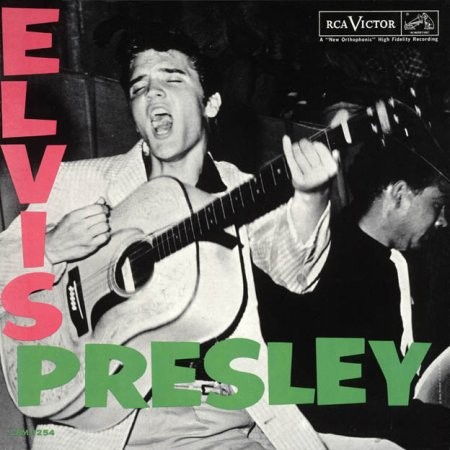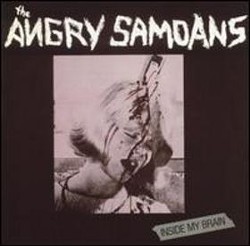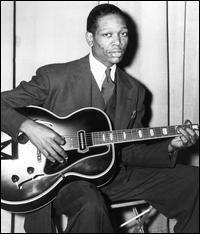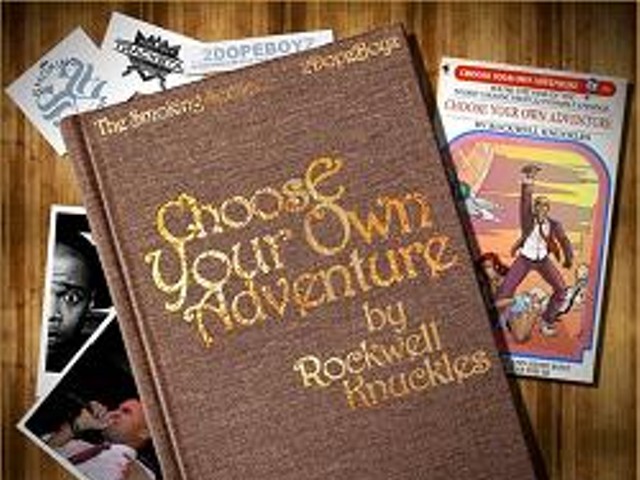Do you still identify with your punk records? While I won't listen to my crusty-punk records like the Exploited and Crass, I will all day long listen to my Circle Jerks, Angry Samoans, Dead Kennedys. That stuff is very much a part of who I am. A lot of it I'll always love because it's sentimental -- and I've got all my Rancid records that I'll never get rid of because they represent a huge block of formative years in my life. Almost every record I've ever bought I still own. I've sold records a couple times just to buy more. If anything, it's like a library for me. I like to have it as something to refer to, even if it's not something I enjoy.
Do you remember the first music you ever bought? The first music I bought was Elvis music. I was obsessed with Elvis when I was seven or eight, and that's when I started playing guitar, when I was eight.
Why were you obsessed with Elvis when you were eight? Because he was the King, man! (Laughs) It was the ultimate rock n' roll. I didn't even understand what it was, but it was a really good gateway into all the Sun Records stuff. At a young age I knew about Johnny Cash, Roy Orbison, the Everly Brothers and all this stuff that is now really important to know about in general music history. Elvis is an amazing gateway for a lot of people to get into a lot of different stuff.
When you were in Nineteen you released a split seven inch with Rock Over London? Did you ever think that because it's a vinyl release that it might one day be a collectible? What were your thoughts going into a vinyl release? We did it real DIY. We dumpster dived for the paper and silkscreened the covers. Split the cost with the other band. We recorded for free and didn't master it. We just had it pressed. We did photocopied inserts and kept the cost down, and sold them for next to nothing.
It's interesting to think: Now more than ever in the history of time there's more things being documented. If you imagine a few hundred years from now, we are going to have a lot more knowledge about this time than we do about a few hundred years ago, through film and audio. I was proud to put something out on vinyl that will possibly stand the test of time. If anything it was just cool. Everyone knows it's cool to hear your own band on vinyl.
You also work at the guitar shop J. Gravity Strings. Working around guitarists all day, do you ever see a crossover of the collector's mentality? Definitely. In fact, there is a record collector who comes in who collects guitars, and we talk all the time. We're into the same type of guitars and the same type of records. We'll go from talking about a record, to a guitar, to another record, to a guitar.
I've made the correlation that I like to have the old Kay guitars, Harmony guitars, Silvertone guitars, stuff that is on these records [that I collect]. I'm a fan of Charlie Christian. I love his tone. His recordings and his tone are revolutionary. He was the first recorded electric guitar player. I had the chance to play the same Charlie Christian-style Gibson on the Rum Drum record. I was able to take one of my favorite recorded sounds and try to duplicate it or translate it to our sound.
A lot of times with my own band, my own recordings, my own songwriting, guitar collecting and record collecting, there is no definitive line between any of them. I'm just in this blur of, "What sound can I get? What sound can I find? What sound can I hear? What sound is out there?" I think it's really just a quest for tone, whether you're playing it, buying records of it, buying guitars that sound like that.
It's unfortunate that a lot of records end up in dumpsters. For that record collector out there who knows what I'm talking about, it sometimes feels like it's fucking fate when you find "that record," especially when it's a 45 or 78, because it's just one song. It's a diamond in the rough, as opposed to an LP. That's why I moved out of it. I was tired of finding Black Flag records. I used to be like, "Ohh, I needed that!" Now it's like the record itself isn't sentimental, because there are ten million of them out there, but finding a one-of-a-kind record is like an artifact. It's sort of archeology.
Then me and my friend Ryan, who's in Rum Drum, take all of our finds and put them on CDs and burn 'em for everyone. It's not like we're hoarding everything. It should be shared. It's something that is like, to me, potential energy. When I see a record, I see a song that wants to be played. It's not like some hierarchy record collecting-thing. We're utilitarian.
Another favorite part of my record collection right now is I like to collect by label as opposed to band. I've been collecting all these Smithsonian Folkways recordings. I've got to show you this one. It's just fucking awesome!
[Wilson abruptly gets up from the living room and runs back to his record collection]
It's just stuff that the Library of Congress was recording, because they were recording stuff. I've got two of these now. Just Indian tribes from the '60s. Anything from Woodie Guthrie, to Lead Belly's prison recordings, to a random tribe's rain dance that, if it wasn't recorded, it would have just echoed into nothing. The fact that this stuff survived is why I try to amass it.
So is traditional blues music meant for the digital age? It would die if it wasn't digitalized. The digital age is amazing. I can't say, "The digital age sucks," because I'm a traditionalist or a purist. It is what it is. I'm not going to say I live in a different time. I don't. I live now, but I'm collecting as much as I can from my favorite parts of all the various eras. I'm just trying to be a safe-keeper of these things. Having 78s not be digitized would mean they'd be lost. I think that now, more than ever, this stuff should be readily available.









